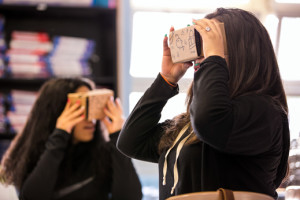Google Aims to Make VR Hardware Irrelevant Before It Even Gets Going
 Google is taking on a chicken-and-egg problem common to any company trying to establish itself as the middleman in a new marketplace. Consumers won’t buy into virtual reality unless there’s something to experience; content companies won’t provide it without a ready audience. “The only way to get around it is to subsidize one side of the market,” says Michael Cusumano, a management professor at MIT who has studied how software and consumer electronics companies conjure up new businesses. “Give away 3-D viewers, or pay software developers to create applications or other content.” Facebook is trying to fill the content gap by hosting 360-degree video as YouTube does, partnering with content companies such as Netflix, and building an in-house production effort called Oculus Story Studio. Google is effectively subsidizing both sides of the market. By making handsets more or less for free out of devices we already own, it’s offering its content partners a potentially much larger audience.
Google is taking on a chicken-and-egg problem common to any company trying to establish itself as the middleman in a new marketplace. Consumers won’t buy into virtual reality unless there’s something to experience; content companies won’t provide it without a ready audience. “The only way to get around it is to subsidize one side of the market,” says Michael Cusumano, a management professor at MIT who has studied how software and consumer electronics companies conjure up new businesses. “Give away 3-D viewers, or pay software developers to create applications or other content.” Facebook is trying to fill the content gap by hosting 360-degree video as YouTube does, partnering with content companies such as Netflix, and building an in-house production effort called Oculus Story Studio. Google is effectively subsidizing both sides of the market. By making handsets more or less for free out of devices we already own, it’s offering its content partners a potentially much larger audience.
Philip Rosedale, founder of the virtual world Second Life and now the CEO of High Fidelity, a company that has raised $16 million to develop ways for people to socialize in virtual-reality environments, predicts that both Google’s and Facebook’s projects will initially disappoint people who expect it to become popular. “Next year there’s going to be a big push to make VR a success, and it’s not going to succeed,” he says. Rosedale thinks it will take a few years for Oculus to reach beyond a niche gaming audience, or for smartphones to be capable of providing a widely acceptable experience. Referring to Bavor’s group, he says: “I have a lot of respect for that team. But I don’t think that doing VR in software on top of a mobile device can be compelling today.”
Bavor acknowledges that Google and other companies investing in virtual reality have much to learn, but he says the only way to do it is to get the technology to a significant audience. And the device for doing that is already—perhaps all too often—in our hands and in front of our eyes. “The technology’s here,” he says. “We’ve seen the proof that you can create wonderful VR experiences with today’s smartphone hardware; the sensors and the hardware and the content are only going to get better.”
Pages
- About Philip Lelyveld
- Mark and Addie Lelyveld Biographies
- Presentations and articles
- Tufts Alumni Bio